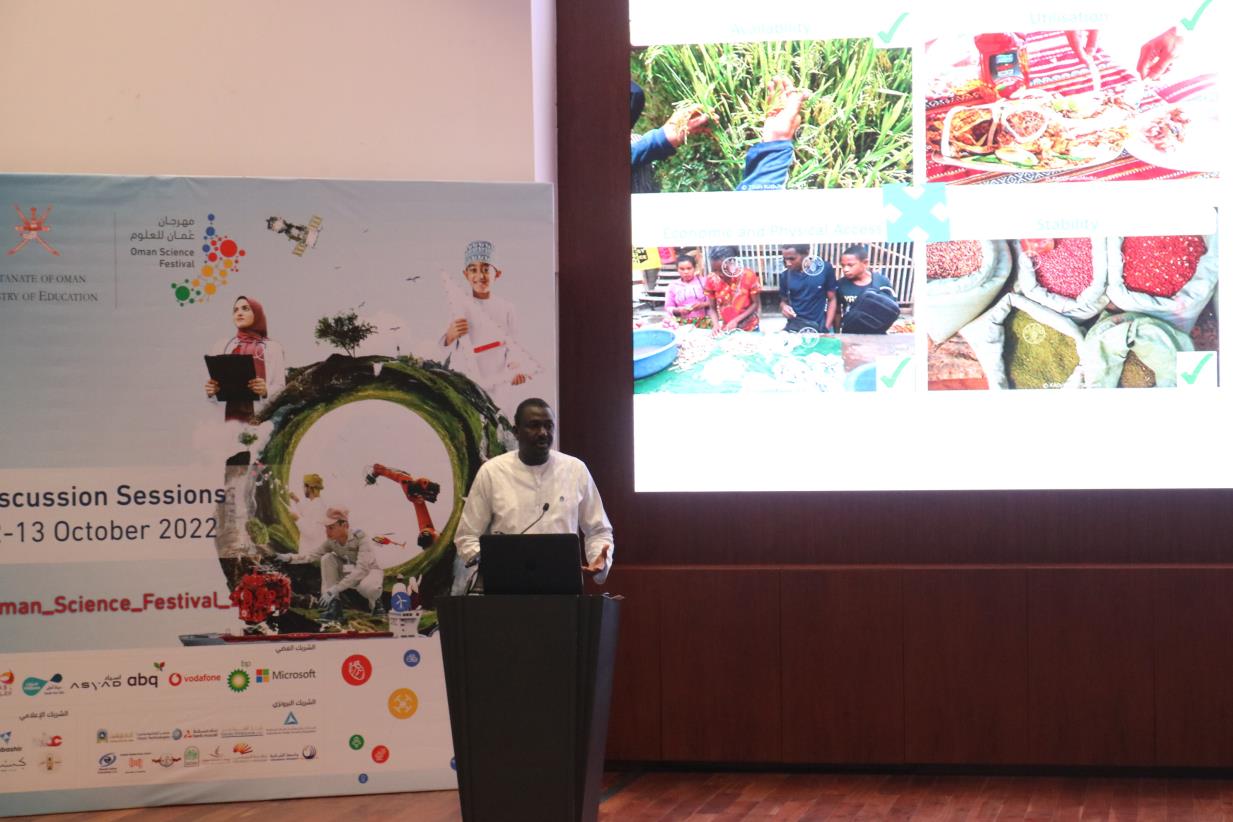Sustainable agri-food systems transformation: challenges and opportunities in Oman

12 October 2022 – The Food and Agriculture Organization (FAO) in collaboration with the Ministry of Education, the Ministry of Agriculture, Fisheries and Water Resources (MAFWR), and Sultan Qaboos University (SQU), organized a session on “Sustainable agri-food systems transformation for better production, better nutrition, better environment and better life: challenges and opportunities in Oman” at the 3rd Oman Science Festival in Muscat. The session offered a platform for presentations and conversations on the national pathway for agrifood system transformation, as well as highlighting innovative approaches and bold and transformative actions and solutions for agri-food systems transformation in Oman to enable food security.
The session was structured into three sub-sessions, each addressing a specific thematic using holistic and food systems perspective, and embracing systemic, multi-stakeholders partnerships, as well as interdisciplinary and multidisciplinary approaches. In his presentation about food security in GCC: challenges and opportunities for regional cooperation in science, technology and innovation.
Dr Abdoulaye Saley Moussa, Natural Resources Officer at FAO highlighted the importance and need to increase local food production to meet the objectives of food security by harnessing science, technology and innovation at a national level, but also strengthening regional collaboration for increasing effectiveness and efficiency. He added that FAO developed for the first time a science and innovation strategy, which aims to support member countries to harness science, technology and innovation for agrifood systems transformation.
The transformation of aquatic food systems through sustainable aquaculture and fisheries was also debated. The session on blue transformation led and facilitated by Dr Lionel Dabbadie, Senior Aquaculture and Fisheries Officer at FAO, highlighted the importance and role of the blue transformation initiative of FAO, which aims at transforming aquatic food systems by managing all fisheries sustainably, by expanding and/or intensifying sustainable aquaculture and by supporting efficient value chains, Dr. Dabbadie, said that “The Sultanate of Oman is the largest producer of aquatic food through capture fisheries in the Arabian peninsula, and it has set high objectives for developing sustainable aquaculture. It may greatly benefit from FAO’s Blue Transformation. If successfully implemented, it will ensure that fisheries and aquaculture take their share of the global food security challenges. Furthermore, the challenges and opportunities regarding new and existing business models and partnerships were outlined, while also exploring innovative approaches and policies to catalyze agri-food systems transformation to deliver the promises of food security for all.
Dr. Lionel Dabbadie, Senior Aquaculture and Fisheries Officer at FAO says “The Sultanate of Oman is the largest producer of aquatic food through capture fisheries in the Arabian peninsula, and it has set high objectives for developing sustainable aquaculture. It may greatly benefit from FAO’s BlueTransformation.”
The Oman Science Festival 2022 was organized from 10 to 15 October by the Ministry of Education at the Oman Convention & Exhibition Center. It hosted scientific workshops, lectures, and an exhibition boot. It brought over 200 participants from government, regional and international speakers, the private sector, civil society organizations, academia, and youth.
